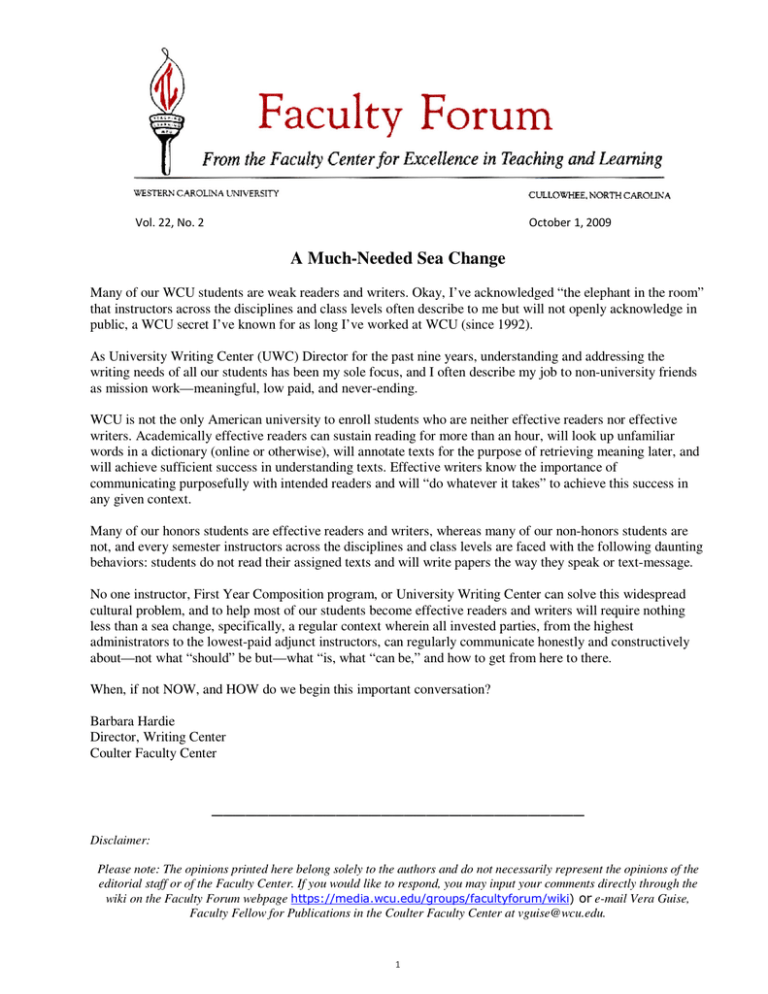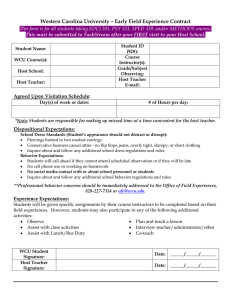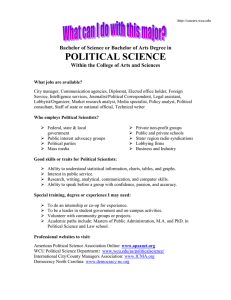
Vol. 22, No. 2
October 1, 2009
A Much-Needed Sea Change
Many of our WCU students are weak readers and writers. Okay, I’ve acknowledged “the elephant in the room”
that instructors across the disciplines and class levels often describe to me but will not openly acknowledge in
public, a WCU secret I’ve known for as long I’ve worked at WCU (since 1992).
As University Writing Center (UWC) Director for the past nine years, understanding and addressing the
writing needs of all our students has been my sole focus, and I often describe my job to non-university friends
as mission work—meaningful, low paid, and never-ending.
WCU is not the only American university to enroll students who are neither effective readers nor effective
writers. Academically effective readers can sustain reading for more than an hour, will look up unfamiliar
words in a dictionary (online or otherwise), will annotate texts for the purpose of retrieving meaning later, and
will achieve sufficient success in understanding texts. Effective writers know the importance of
communicating purposefully with intended readers and will “do whatever it takes” to achieve this success in
any given context.
Many of our honors students are effective readers and writers, whereas many of our non-honors students are
not, and every semester instructors across the disciplines and class levels are faced with the following daunting
behaviors: students do not read their assigned texts and will write papers the way they speak or text-message.
No one instructor, First Year Composition program, or University Writing Center can solve this widespread
cultural problem, and to help most of our students become effective readers and writers will require nothing
less than a sea change, specifically, a regular context wherein all invested parties, from the highest
administrators to the lowest-paid adjunct instructors, can regularly communicate honestly and constructively
about—not what “should” be but—what “is, what “can be,” and how to get from here to there.
When, if not NOW, and HOW do we begin this important conversation?
Barbara Hardie
Director, Writing Center
Coulter Faculty Center
_________________________________
Disclaimer:
Please note: The opinions printed here belong solely to the authors and do not necessarily represent the opinions of the
editorial staff or of the Faculty Center. If you would like to respond, you may input your comments directly through the
wiki on the Faculty Forum webpage https://media.wcu.edu/groups/facultyforum/wiki) or e-mail Vera Guise,
Faculty Fellow for Publications in the Coulter Faculty Center at vguise@wcu.edu.
1
Coulter Faculty Center for Teaching and Learning
Last month we received no responses to the article by Planning for Changes to the WCU Learning
Management System (WebCAT) by Carlie Merritt, Health and Human Services. It’s not too late! Send us
your comments! However, we did receive a thoughtful and in-depth response from Debbie Singleton from
Health, Physical Education and Recreation to the May 2009 Faculty Forum which featured an article entitled
Make Room For Baby: The Rising Teen Pregnancy Rate and It’s Challenge to WCU by Sharon
Jacques, Nursing Program. We are pleased to share that with you and urge YOU to respond to
Faculty Forum articles and consider writing one yourself.
Sharon Jacques’ article, “Make Room for Baby…” in the May Faculty Forum sheds light on
a topic that many individuals are very uncomfortable discussing within a classroom setting or with their
children. Sex education does not need to be a “taboo” subject. As evident in popular culture, sex is clearly
mainstream. There are television shows depicting the life of a pregnant teenager, movies that glorify sexual
encounters that have no negative consequences, apparel lines for tween girls that include padded bras and
thong underwear, and music with explicit lyrics that describe sexual anatomy. If information about sex is
everywhere, then why do we have a problem with teenage pregnancy rates or sexually transmitted diseases?
Maybe it is because we have approached education about sexual health as an all or nothing debate. If we get
teenagers to promise to be abstinent until marriage, then we won’t have these problems. Or… If we educate
teenagers about sexual health in a comprehensive manner, then we won’t have these problems. It is not that
simple.
Sex education needs to be part of a comprehensive, holistic approach that demonstrates positive
adolescent health outcomes. A comprehensive program needs to include opportunities for teens to participate
in lifetime recreation and sport activities, involvement in the arts, educational support that assists students
with career planning and college preparation, work experiences, money management, and a family life/sex
education program. In addition to the support programs, teens need access to comprehensive medical care
including reproductive health care and mental health counseling. These types of programs have demonstrated
lower pregnancy rates, delayed onset of intercourse, better sexual health behaviors and higher graduation
rates.
The second aspect of comprehensive, holistic sex education is the responsibility of parents and/or
guardians. Children look to their parents for guidance, help with decision making, and the clarification of
morals and values. Parents need to take the initiative to assist their children in understanding healthy
sexuality and its relation to their overall health and development. This means more than handing them a book
on puberty and saying, “read this and then you will understand”. A more effective method is to take the time
to sit down with your children and read the book together, helping them to understand what will or is
happening to their body and being available and willing to answer their questions. Of course, parents need to
understand and have some knowledge about sexual health in order to feel comfortable communicating with
their children.
The third aspect of comprehensive, holistic sex education is to provide young adults with the
knowledge and resources to make healthy decisions surrounding their overall wellness, including their sexual
health. In many ways, we have these opportunities already in place here at Western. There are courses on
women’s health, sexual health, human sexuality, marriage & family and probably others that I am not aware
of. The Women’s Center, Wellness Program, Counseling Services, Health Services and the Jackson County
Public Health Department are all great resources for students. Yet, there are students who still are unaware
of the consequences of their risky sexual behaviors or their lack of knowledge surrounding their choices for
prevention of pregnancy or sexually transmitted diseases. If we are going to be effective in reducing rates of
STD’s transmission and unintentional pregnancies among college students, we need to increase educational
opportunities and awareness. If we are going to prepare future parents to be a positive aspect of their
children’s sexual education, then we need to prepare them. (Students in my Health 360 have some interesting
ideas on how to address these questions; their comments are in the later part of this response)
2
The fourth aspect of comprehensive, holistic sex education is to embrace the technology that will allow
educators to reach our target population, teens and young adults. Sex education in a classroom setting can be
ineffective and insufficient. In many school districts there are constraints placed on what and how you can
teach family life/sex education. In college level health classes such as our Health 123: Health & Wellness
course, sexual health is only one small part of what we try to cover during a semester. Sometimes we find
ourselves devoting only two days to the subject. Is this enough, do students need more? How can we reach
students besides a classroom setting?
The state of North Carolina may have an idea. The Adolescent Pregnancy Prevention Campaign of
NC, based in Durham, has created a “Birds and Bees Text Line”, an educational text messaging service. The
Birds and Bees Text Line allows teens to obtain medically accurate answers to sex and health related
questions through personal, anonymous text messages. The line is staffed by individuals who have graduate
degrees in public health or social work. The service is supported by a grant from the state health department
and is one of several efforts across the country in which health educators are using technology to offer teens
“sex ed on their turf”. In addition to text messaging services, there are blunt websites on sexual health such
as Columbia’s Go Ask Alice!, Atlantic Health’s TeenHealthFX, and Planned Parenthoods’ TeenWire. My
students in Health 360 visited these websites and found them insightful and useful.
Educating our children, our students, and ourselves about sexual health shouldn’t be such an
uncomfortable experience. If we realize that our sexual health is an important component of our overall
wellness, we can learn to respect it in the same way we limit the amount of fat in our diet, make sure we
exercise each day, and put on sunscreen to protect our skin.
I asked my students from Health 360: Sexual Health Through the Lifespan to respond to Dr. Sharon
Jacques’ article in the last Faculty Forum. Here are some of their comments:
Classes being offered at WCU are essential for educating students about healthy sexuality. I have
learned more in my Health 360 class concerning sexual health than in the past 20 years. I think it should be a
requirement for every student to take a class like this, plus it was fun. Also, maybe a class could be offered for
students to learn how to respond to educating their future kids concerning sexual health.
Maybe Western feels like they have helped students a lot by having the phone boxes, less expensive
contraception and counseling services. I believe Western can step it up a notch. I believe contraception at the
health center should be free. I cannot even count the number times I have needed a cat tran late at night and
ended up walking to my dorm. I can only recall seeing two emergency phone boxes, and I am a sophomore. I
also rarely see police around campus. WCU could improve in these areas.
As for educating the community in general, I think just advertising and getting the word out is doing
great justice for individuals. I believe that special events that are held on the UC Lawn displaying information
about rape or sexual assault victims are helpful. It reaches people on an emotional level. I think WCU should
do things like that and get people involved all over Jackson County.
WCU does a lot to promote sexual health practices on campus. It is unfortunate that so few students
listen. The best we can do is to continue to fund programs and advertisements. We could also make it more
convenient for students by having free condoms and programs available in all the residence halls and maybe
even in some academic buildings.
As mentioned in the article, the best way to prevent unwanted pregnancies and the transmission of
STD’S and STI’S is by educating our future parents and teachers. People are uncomfortable talking with kids
about sex so kids are unaware of the risks and ways to protect themselves. If we can become informed and
comfortable enough to talk openly and honestly about sex with our children and students, we will see a great
improvement in the sexual health of our community.
Conduct outreach programs through health fairs at local schools, recreation centers, churches,
anywhere that will allow a WCU health fair to come. The fair can include booths dealing with different topics
3
such as pregnancy, gender issues, sex choices, games, and learning opportunities through interactive question
and answer sessions. We need to be informative in every aspect of educating these groups; parents, teachers
and students.
I think that WCU can educate students on healthy sexuality as well as helping decrease pregnancies by
getting more word about it out there. Although I have had sex ed classes since fourth grade, I still learned a
lot from this semester due to the fact that my earlier classes didn’t go into this much detail with my younger
age group. They do have contraceptives here on campus but how many students really know about it or where
to exactly get them. There are some people who have no idea where the health center is here on campus, let
alone where they can receive free condoms. I think more programs or awareness events should be offered
throughout the year.
As an assignment this semester in Health 360, myself and a partner taught a demonstration workshop
on breast and testicular self-exams in a residence hall. None of the men knew how to do a testicular exam and
very few women knew to check for breast cancer. These are important things to know regarding health and
lifestyles. In my sophomore year of high school, I had to take home a baby that was so realistic for an entire
weekend that it opened my eyes and made me think, twice about engaging in activities that could lead to an
unwanted pregnancy. I think it would be interesting to see how if a class of college students could do the same
activity. If they did, then there may be more awareness before engaging in un-protective sexual activities.
As a student at Western Carolina University, and possibly the next generation of parents, I feel like
more programs and events should be put in place as an effort to decrease teen pregnancy, unplanned
pregnancies, recognition of gender issues and a decrease in sexually transmitted diseases. WCU offers many
courses about sexuality, as well as awareness for gender issues and STD’S. I believe that similar programs
should be offered throughout the county and the community. WCU could provide courses and programs
outside the university so that people can be more aware.
After reading the article many options came to mind that WCU can do to educate students about
healthy sexuality. I know just from taking this course (Health 360) I have probably tripled my knowledge on
sexual health and just being healthier as a young adult in general. I think offering more in depth courses like
Health 360, PSY 331 and SOC 365, would be a great start. We all have to take electives and I know I was very
excited about taking this course when I signed up for it.
Another way to get more information out to WCU students about healthy sexuality would be pamphlets
distributed to dorms and freshmen when they first arrive at Western. Another great resource on campus is the
women’s center. That could be a place that would be great to put more healthy sexuality information. It would
be beneficial to have a men’s center on campus for the same reasons. These would be great resources because
sometime separating genders makes it easier to get the facts and be safe without someone feeling
uncomfortable about asking questions or seeking out information.
One of the biggest scares on college campuses is fear of getting pregnant or getting someone else
pregnant. WCU needs to get information out about contraceptives by having presentation in dorms and
making them readily available to students. Even though they are offered at the health center, not everyone
knows that. I also think more STD awareness needs to be brought to the student’s attention.
We need better access to condoms other than vending machines (uncertain about brands, some don’t fit
properly) and Health Services (embarrassing to ask or take them in front of people you don’t know). WCU
should provide more learning opportunities for all students in regards to sexual assault and STD prevention.
Have students participate in service learning opportunities where they are educating other WCU students
about sexual assault and STD prevention. Provide information for parents about college students and sex so
they can be informed and be able to talk to their sons or daughters about it or know where to send them for
help .I hope in the future that WCU becomes more involved in this issue…. Because I had not seen anything
about prevention in high school or college until I took this class (Health 360).
4
WCU can continue to offer the options it does for students. I really think it helps that our health
services provides so much for students. Condoms, contraceptives, and the vaccine Gardisil are all great to
have locally at a college campus. I think more informative classes (such as Health 360) should be offered.
This class could train students as peer educators to go to local middle and high schools and educate young
boys and girls on the matters of sex and teenage pregnancy. I personally don’t think it’s a topic that should be
sugarcoated. I don’t think schools are doing enough for young kids and it is up to us, as future educators, peer
mentors, and role models to help our community. I think WCU should hold a seminar for those who want to
teach this topic in the schools and train them to do so. If we can make the community more aware, maybe we
could reduce the rates of teenage pregnancy and STDS.
The easiest way to solve all of these problems is to stress sex education. I know that that there are already
programs in place that teach young people how to be smart as far as sex goes but we need to take it to another
level. Kids are bombarded by the media. Sex sales stuff on TV, it is hard for a child not to be influenced by it.
That is why parents play a bigger role than they think they do. Whether kids admit it or not they learned the
majority of what they knew from their parents. By stressing the importance of healthy sexuality to us (college
students) now, we will in turn carry that on to our children. Some ideas: Education that teaches kids about
sex and how to deal with uncomfortable situations…. A mentoring system to help teenagers deal with their
questions about sex… Classes such as Health 360 allow us to be very open about the topics and as a result we
learn a lot both through the class and from each other.
Debbie Singleton & students
Health, Physical Education and Recreation
.
5




